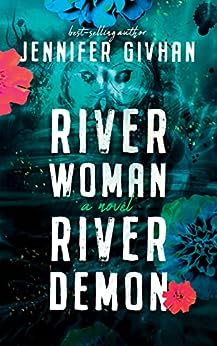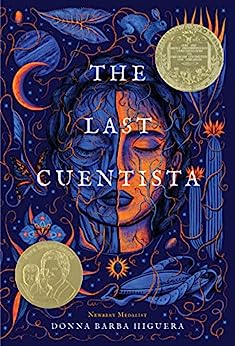- About Us
- Advertise with Us
- Bios
- Books & Resources
- Books We Love
- Contact Us
- Disclosure
- Glossary
- How We Select Titles
- Our Story
- Resources
- Suggest Your Book
- Where to Find Heart.Wants.Book
- Where to Find Heart.Wants.Books
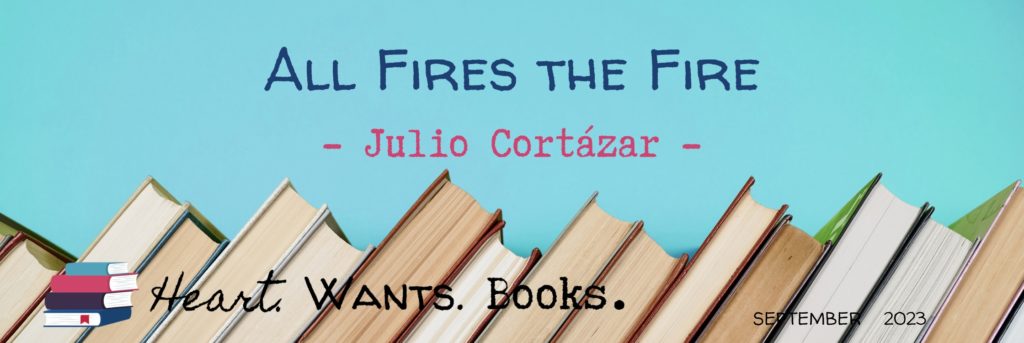
The following post includes affiliate links. More details here. As you’re doing your Amazon shopping, we’d be ever so grateful if you’d use our affiliate link to do so as it helps pay the bills around here!
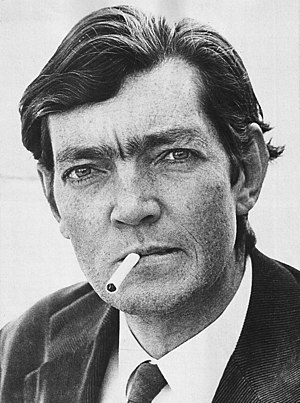
Julio Florencio Cortázar was born August 26, 1914 in Brussels, Belgium, to Argentine parents and whose father was connected to the Argentine diplomatic service there during the occupation by forces of Kaiser Wilhelm II. The family moved around Europe for a few years before settling outside Buenos Aires by 1919. He was a sickly child and spent much of his young life in bed reading. Encouraged by his mother who spoke several languages, the future teacher, author, and translator became obsessed with Jules Verne. By eighteen Cortázar earned a certificate to teach elementary school, and soon after attended the University of Buenos Aires to study philosophy and languages. He dropped out for financial reasons without ever earning a degree. After working for some time as a lecturer and translator in Argentina, Cortázar moved to France in 1951 where he would remain a resident until his death in 1984, though he traveled widely. Cortázar wrote novels, short stories, poetry, dramatic works, and non-fiction in his native Spanish. He is also known for his translations of French and English works, most notably Robinson Crusoe and the prose of Edgar Allan Poe.
In his own works, however, Cortázar focused on characters of South American background, no matter the setting in which the story took place. He loved his homeland, and was determined to bring this representation of Hispanic peoples to the rest of the world. He was an experimentalist, writing stories not dependent upon a linear understanding of time, and dabbled in magical realism. To note, his most famous novel, Hopscotch, is also considered an antinovel, because the reader is invited to read and rearrange the work in a plan prescribed by the author. I’m thinking it’s a ‘choose your own adventure’ situation from 1963. If it is anything like the stories in All Fire the Fires, the antinovel was certainly not written for children.
Now, let’s get down to business with Cortázar’s All Fire the Fires. I started reading them knowing nothing more about Cortázar than he was a popular mid-twentieth century Argentine author. I did not realize how popular his works were, or that he lived much of his life exiled from his homeland because of his political ideologies. In looking back, I can feel his longing for this missing homeland in the final story of the book, The Other Heaven. In it, the first-person narrator regrets not introducing himself to a stranger in a Parisian cafe, whom his friends just call ‘the South American.’ He regrets not allowing himself to speak his native tongue to another native speaker in a place filled with reminders that they are far from home. And that maybe, a timely reminder that the South American was not alone, could have stopped him from taking his life several weeks later. That is something anyone would regret and consider for the rest of their life, and I think that will live as a reminder to me to always reach out, when I can, as it will cost me little effort and can bring much peace.
The other seven stories are also weird and poignant in equal measure. The first story is a weeks-long traffic jam on a thruway into Paris. There’s a story about a nurse and her appendectomy patient. And, the one I think is my personal favorite, about a flight attendant who finally takes a vacation to a random island in Greece after seeing it from the plane at noon for weeks and weeks. I’m giving All Fire the Fires 3 solid stars, and I’m tempted to give it 3.5, but I can’t really warrant much more than a ‘meets expectations.’ (I do understand that ‘expectations’ in this specific sense is vague as I didn’t have any background to provide me with expectations when I began reading.) I just got big ‘these are weird stories and the point is emotion driven not plot driven’ expectations and that’s just the kind of ‘meets expectations’ read we’re going to get from this collection of short stories.
~Ashley
As we’ve previously shared, our reading goals generally include ensuring we’re reading some titles from people who don’t look like us, and if you’ve been around here a bit, you know we like to take full advantage of history and heritage months celebrating cultures and people groups do dig in with authors from those cultures and groups, so here we are. We also like to utilize my holds list as a way of limiting our scope of titles to explore (because it’s V extra, still), but sometimes it is also lacking in diversity and that leads us to looking through lists on the interwebs, which is how Julio Cortázar came to be on our radar. Ashley gave a thorough biography, so I’ll just add that he is considered one of the founders of the Latin American Boom and is touted as having influenced a generation of writers who are Spanish-speaking. Yes, that means you can file this under one of those “important” authors “they” suggested we read. While I’m not sad to have read this work, I was not appropriately prepared, even after reading the marketing copy while perusing assorted lists, and cross referencing them with our libraries.
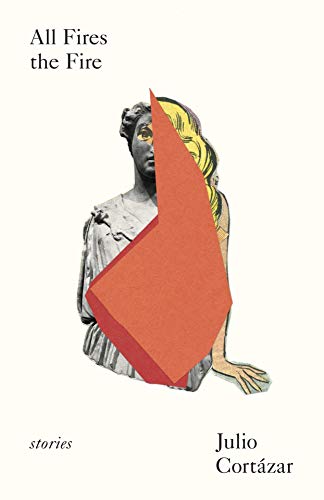
All Fire the Fires is a short story collection that includes a wide variety of topics and tales, all bordering on absurdist, which you know isn’t our favorite thing around here. Ashley mentioned the weeks-long traffic jam, which I present as an example. The stories seemed to have a theme of characters trying to find themselves. Our appendectomy patient was a teen, the drivers in the traffic jam were struggling with identity in this new dystopian environment, and our narrator in the final story is working through the mess of who he wants to be compared to what his mother expects of him. These stories are also about family, either found or blood, and how the different personalities interact with each other. The collection was definitely an interesting study of character, as Ashley also mentioned.
What struck me about All Fire the Fires more than anything else was how it felt like prestige writing, when my current vibe has been leaning solidly into genre writing. While reading this, I listened to an episode of What Should I Read Next Podcast wherein Anne and guest Sai discussed prestige (aka literary) and genre books, TV, and even video games, and that has stuck with me. With the “they” influencing this read, the structure that was sometimes meshing multiple stories in the same paragraph (which was already quite lengthy), and the character study, the collection definitely feels very literary and worthy of an intense, academic-style discussion. All that said, I did enjoy the academic-feeling, almost throw away sentence wherein a character was surprised by another’s use of the familiar “you” compared to the formal. Props to the translator for leaving that in for those who recall their foreign language classes from yesteryear.
Overall, I’m also giving All Fire the Fires three stars. It wasn’t the right time for me to read it (while I’m living my genre era), but I appreciate the literary aspects of the work and the ways in which I see styles of Cortázar in more modern works. I’m definitely glad I read some of his work and appreciate the collection, but don’t see myself seeking out more in the foreseeable future.
What’s a text you’ve read because some “they” said you should and yet still appreciated for its artistic merit?
~Nikki
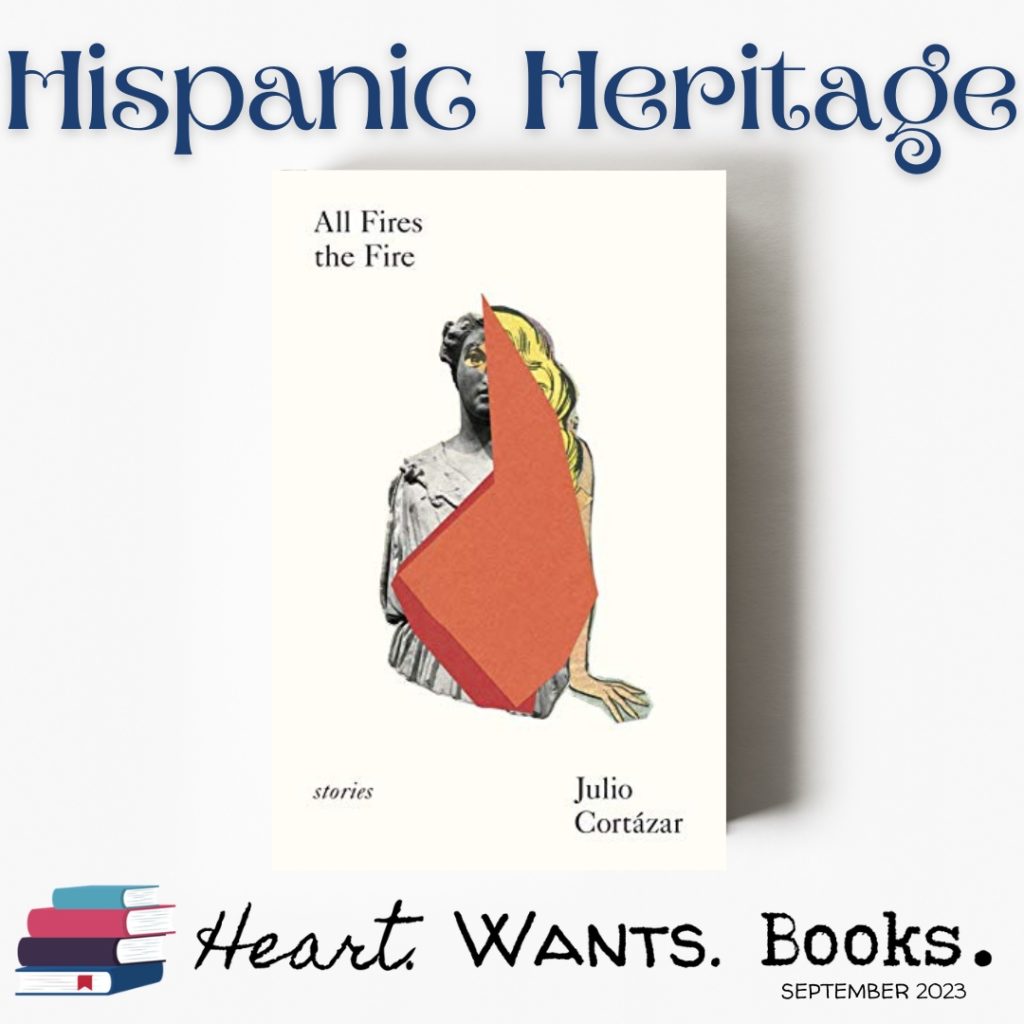
PLEASE SUPPORT US WHEN YOU SHOP BY FIRST CLICKING ON THE IMAGES BELOW:
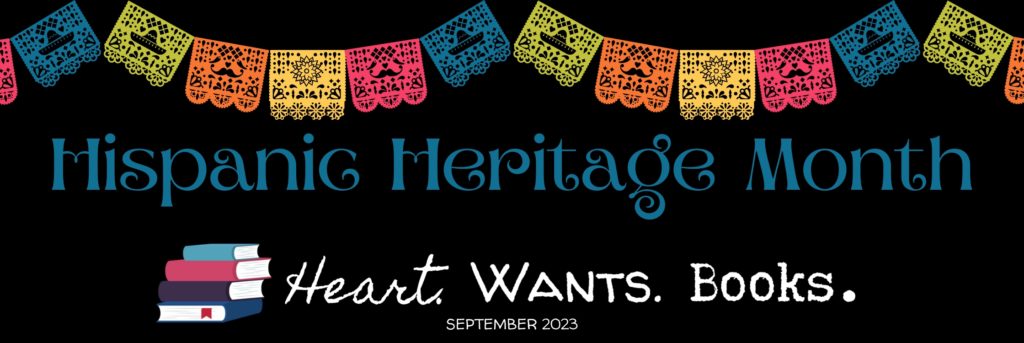
The following post includes affiliate links. More details here. As you’re doing your Amazon shopping, we’d be ever so grateful if you’d use our affiliate link to do so as it helps pay the bills around here!
In case you’re new around here, fall through the end of the year is a whole vibe at Heart.Wants.Books, and we are HERE FOR IT! There are a couple of months that have solid plans months out, or at least solid themes with so much fun to consider, and others that just magically (more or less) fall into place. September is one that we like to double down on (and you’re welcome to guess about others in the comments). While we do recognize that National Hispanic Heritage Month runs from September 15 through October 15, we’ll be focusing on reading Hispanic authors in September (and welcome your recommendations of witchy titles from Hispanic authors in the comments as they can definitely be considered for October). We’re really excited to share with you how each of this month’s titles came to be on our list, and they’re all different! Check back on Thursdays in September to read our reviews of:
All Fires the Fire by Julio Cortázar
River Woman, River Demon by Jennifer Givhan
The Last Cuentista by Donna Barba Higuera
What are you looking forward to reading this month?
~Ashley & Nikki
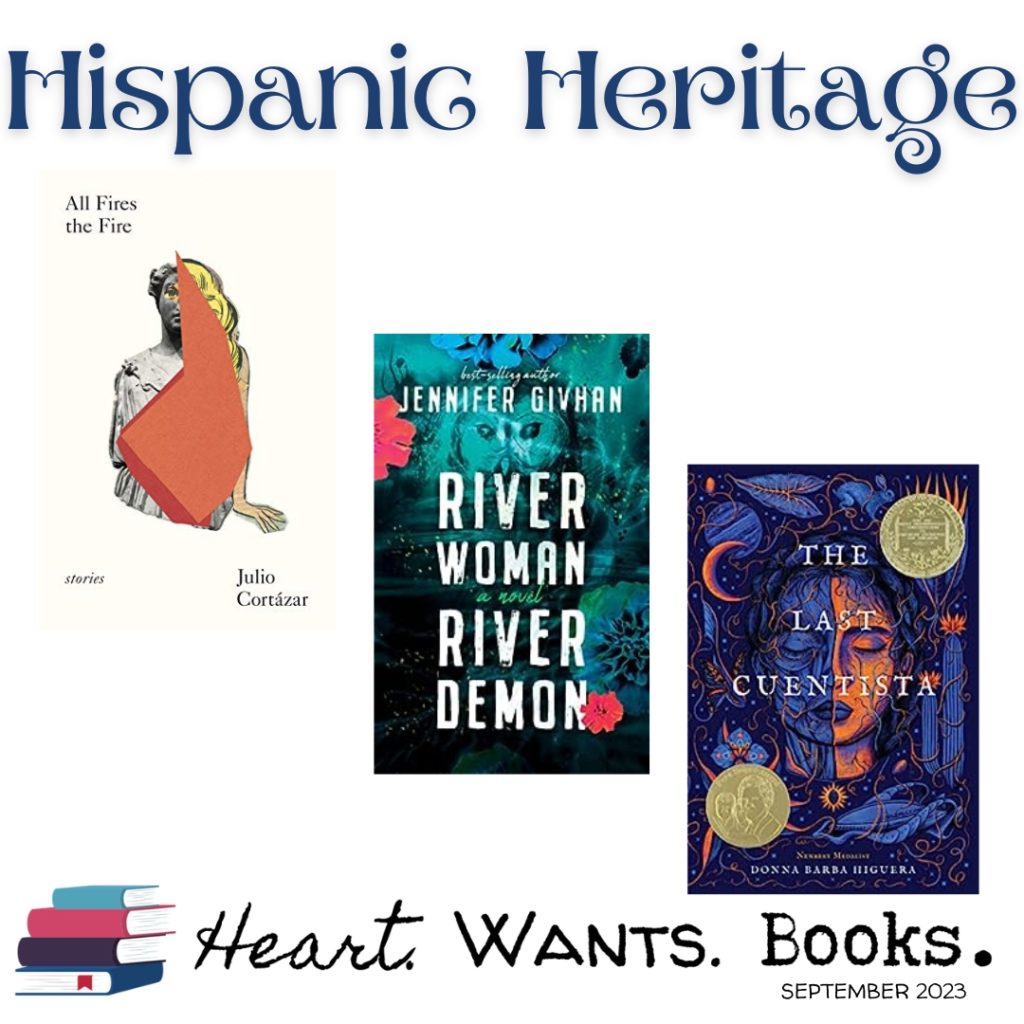
PLEASE SUPPORT US WHEN YOU SHOP BY FIRST CLICKING ON THE IMAGES BELOW:
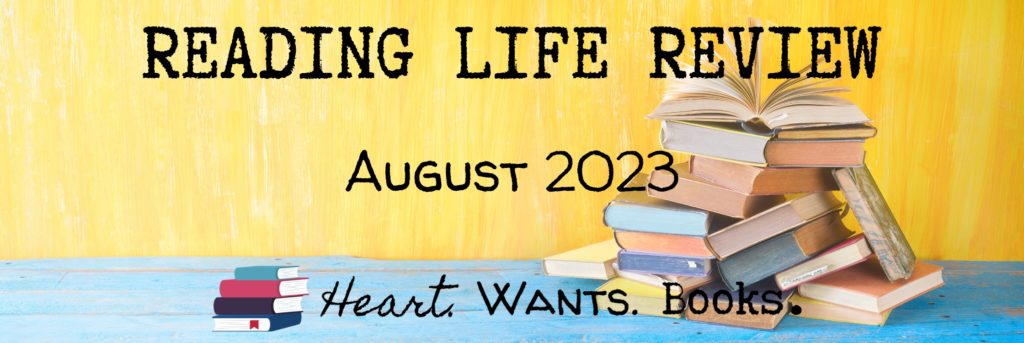
The following post includes affiliate links. More details here. As you’re doing your Amazon shopping, we’d be ever so grateful if you’d use our affiliate link to do so as it helps pay the bills around here!
Ashley IN MEDIAS RES
*Ashley wants to point out that she’s been waiting for this to come off hold at the library for over a month because she didn’t have time to finish it the first time… It’s a struggle.
Nikki IN MEDIAS RES
Ashley FIN
- Heir of Fire (Throne of Glass #3) by Sarah J. Maas
- The Last Tale of the Flower Bride by Roshani Chokshi
- The Simple Sabbat: A Family Friendly Approach to the Eight Pagan Holidays by M. Flora Peterson
- Die with Zero: Getting All You Can from Your Money and Your Life by Bill Perkins
- Barbarian’s Taming (Ice Planet Barbarians #8) by Ruby Dixon
- Happy Place by Emily Henry
- Discipline is Destiny: The Power of Self-Control by Ryan Holiday
- Romantic Comedy by Curtis Sittenfeld
- Beyond the Wand by Tom Felton (audio)
- Crown of Midnight (Throne of Glass #2) by Sarah J. Maas
- How to Grow Orchids by Fran Barnwell
Nikki FIN
- Scot on Her Trail (The Hots for Scots #2) by Caroline Lee
- The Earl’s Brazen Widow (Those Kilted Bastards #2) by Caroline Lee
- The Last Tale of the Flower Bride by Roshani Chokshi
- The Duke’s Virgin Sister (Those Kilted Bastards #1) by Caroline Lee
- Mating in Captivity by Esther Perel
- A Scot Mess (The Hots for Scots #1) by Caroline Lee
- Barbarian’s Taming (Ice Planet Barbarians #8) by Ruby Dixon
- Lady Reckless (Notorious Ladies of London #3) by Scarlett Scott
- Beyond the Wand by Tom Felton (audio)
- Happy Place by Emily Henry
- Blackstone Ranger Scrooge (Blackstone Rangers #6) by Alicia Montgomery
- Romantic Comedy by Curtis Sittenfeld
- Crown of Midnight (Throne of Glass #2) by Sarah J. Maas
- Viscount of Villainy (Sins and Scoundrels #6) by Scarlett Scott
Darling readers, is it weird that when I was pulling together the above lists from our Goodreads profiles, I was struck by the amount of bookish soothing I needed this month? August was so extra in my house. We had back to school, new schedules for everyone, a new middle schooler, the start of afterschool activities for both children, and it was so ding dang hot for at least half of that time. I do not apologize for my comfort reads, and I do not feel feelings about their presence, I just notice. I am proud of myself for not pushing (too hard) to read titles that didn’t feel right for the moment in time. I leaned in, and I did what felt like the next right thing. In the end, shouldn’t that be what our hobbies are about? Soothing our souls during times that are challenging or overwhelming in some way?
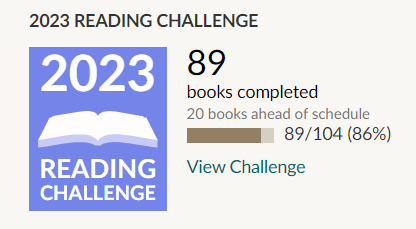
Given all those comfort reads, I don’t have a ton to say about reading this month. I met my basic goals of including some diversity among my authors and protagonists, and I honored the season I’m in, so all of those are wins. I would recommend any title I’ve read for different folks at different times, and wish to remind folks that some are breezy and others will dig deep down in those feels and make you weep (I’m still glaring at you for that Romantic Comedy and especially Happy Place). I am thoroughly enjoying our Maas Adventure so far as we accompany Celeana on her hero’s journey and observe as the ensemble cast grows and develops too. I think this idea is one that is sticking with me lately, so I’ll leave you with it: this last month, my reading list is challenging me to consider people’s backgrounds, to be more communicative, and to lean into my feelings.
How is your reading life helping you to grow or develop lately?
~Nikki
While Nikki talks about her comfort reads within a season of transition at her house, I really want to discuss what is probably my favorite book of the month. It’s a nonfiction title written by a Black male author! Die with Zero sounds like a book you’d read on your deathbed when in all actuality it is a book you want to read while planning your LIFE. It is about dying with zero money leftover but it’s not about just having no money. It is about not leaving the people and charities money from your estate, but it’s also about giving them the money to do good when they need it now.

Bill Perkins discusses how there’s a balance between our health, our ability to earn money, and the time of our lives where our enjoyment of money is the greatest. Meaning we get the most life and experience out of the dollars we spend. He repeatedly reminds us that when we are 80 years old we won’t need $10,000 to go on an expensive ski vacation, because we (more than likely) would not have the energy or health capability to ski. Even if we had the capability, perhaps the risk of an accident is too great to contemplate at that age. So, a $10,000 ski vacation would be better off spent doing before you’re 45, or even before you’re 35! But what typical 30 year old can afford a $10,000 vacation? Not many of them – however, most 65 year olds can. So, why don’t we ‘borrow’ from our future earnings for these once in a lifetime events and experiences? And not in a way that we’re going into great amounts of debt for them, but in a way where we’re perhaps not saving as much in our retirement accounts this month, or putting off making another big purchase for a few months (like a car or house). Our income typically grows the older we get, and our ability to make more money doesn’t decrease over time the way our ability to enjoy our money does. The same reason why we would spend money on ourselves when we’re younger rather than just hoarding it for a future we might never get to see, is the reason we would give away our money to our heirs and our favorite charities while we are still alive. If you have children, it is more likely that they could use money to help them through college, go on a once in a lifetime trip, or put a downpayment on their first house. By the time you pass after a good long life at 85 years old, your children are typically in their late 50s or 60s and would not really have a big NEED for the money you would leave them. But their need for the money when they are younger so that they could enjoy life while their health and energy allows is top notch financial planning. Perkins isn’t saying don’t save for your ‘golden years,’ but he is saying don’t hoard for your golden years by avoiding enjoying your younger years. Make memories with your people now, give to your favorite charities while you can see the good it does, give of your time now if you don’t have the treasure you’d want to give. The short explanation is take care of future you but not at the expense of the you that is here now, with the people you have now. LIVE NOW.
And, there you have it. A title that gave me big feelings and a mindset shift towards big goals.
~Ashley
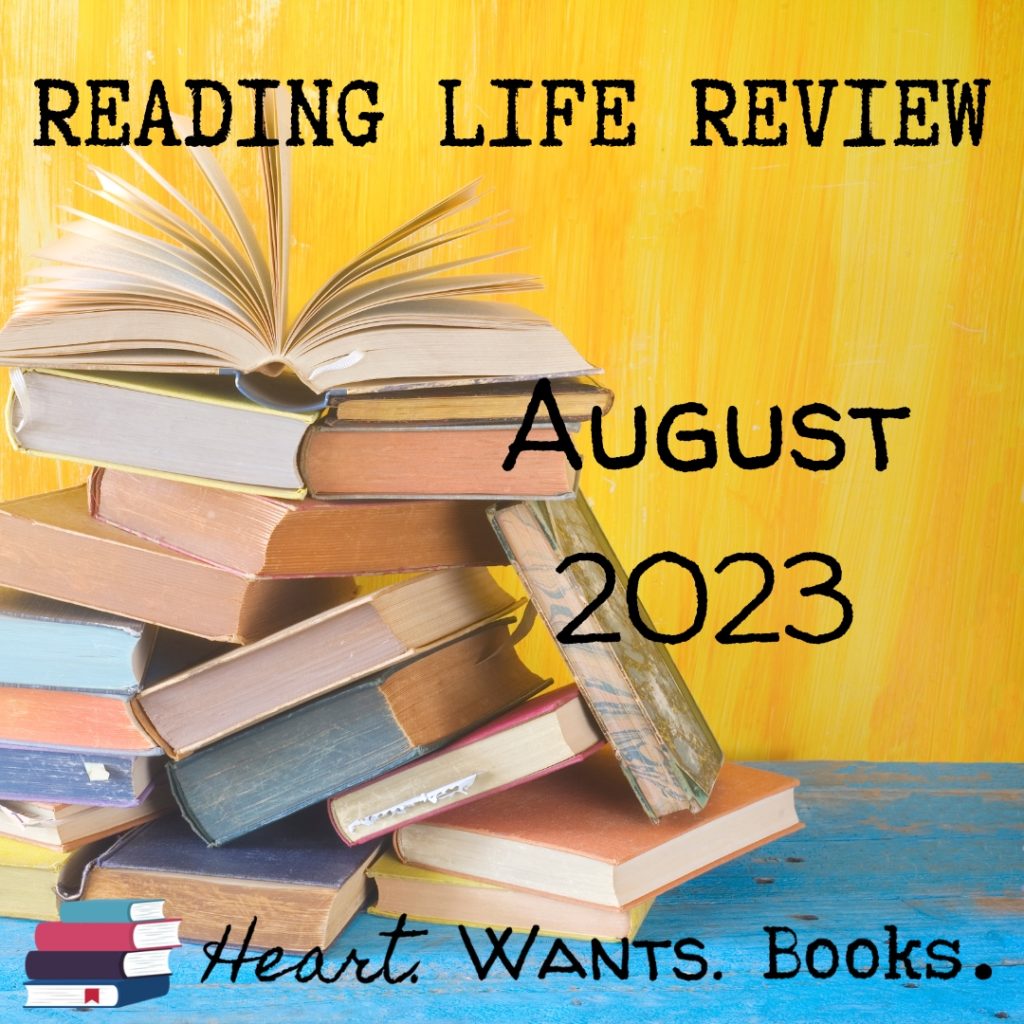
PLEASE SUPPORT US WHEN YOU SHOP BY FIRST CLICKING ON THE IMAGES BELOW:
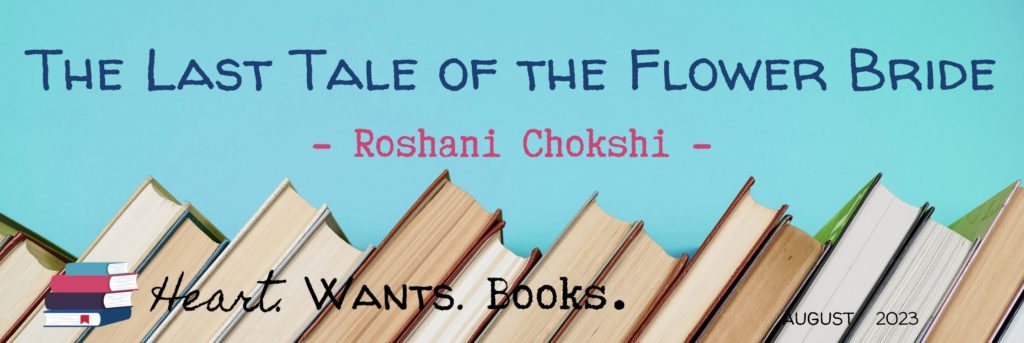
The following post includes affiliate links. More details here. As you’re doing your Amazon shopping, we’d be ever so grateful if you’d use our affiliate link to do so as it helps pay the bills around here!
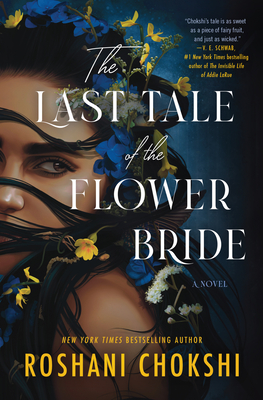
Darling readers, I went into reading The Last Tale of the Flower Bride by Roshani Chokshi knowing nothing other than this is Chokshi’s adult debut and what she said about the writing of the novel on Instagram. I was not ready. Not at all. The marketing copy would have likely been quite helpful. It is 100% spot on when it compares the atmosphere to Mexican Gothic but I don’t agree with the “dreamy enchantment” of The Invisible Life of Addie LaRue. Something about The Last Tale of the Flower Bride is dark and very gothic feeling in a way that Addie just isn’t. All that said, I encourage readers to pick up The Last Tale of the Flower Bride in the fall, or perhaps winter, but summer didn’t feel right to me.
But what is The Last Tale of the Flower Bride about? Well this lyrical novel is about a poor, modern-ish scholar who marries a mysterious, beautiful heiress on the condition that he never pries into her past. As readers can easily predict drama ensues, causing him to do just that. After a lengthy deep dive into how these two meet and what their life together is like, they are called to the house she grew up in to visit her dying aunt one last time. I love it when the setting of a book is a character, and this house is very much a character! The house, the aunt, and his scholarly curiosity lead our Bridegroom on an interesting adventure, as he tells of his exploits alternating with stories of her growing up. It’s a wild, gorgeous ride, and I really enjoyed unraveling her secrets along with the Bridegroom, and I even adored the way it ended!
I’m giving The Last Tale of the Flower Bride 4 stars. While it wasn’t the right book at the right time for me (to the point I almost DNFed it, for now, but I do recognize the glorious nature of the work), it is a gorgeous story, poetically told and I’m looking forward to seeing what Chokshi chooses to gift us with next. She retains her season pass status, and The Gilded Wolves retains its status as my favorite of hers.
What’s a book that you read at the wrong time but still enjoyed?
~Nikki
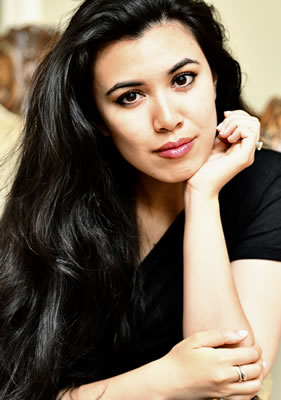
This is our fifth! review of a Roshani Chokshi title, and I’m so glad that she has a season pass for me. She’s still the author of the bestselling young adult found family trilogy, The Gilded Wolves, which are currently available in Kindle Unlimited! She’s still the author of the Pandava series featuring Aru Shah which is published by the Rick Riordan Presents imprint. She’s still living in Atlanta with her husband, but they have recently added a bébé! (Which we saw on IG stories over a month ago.) I hope their cat plays nice with the new addition, no thwarting required.
The Last Tale of the Flower Bride was released on February 14th of this year. And, not only is that Valentine’s Day, but Instagram has graced me with the knowledge that it is also Chokshi’s birthday. She released her adult debut title on her birthday before giving birth to her first child and I think that’s a beautiful thing. Also a beautiful thing is what she said in her ‘welcome to the world’ post regarding that book release:
“To write it, I needed the perspective of age. In many ways the story is about the tension of wanting to grow up and enter the real world and still be young enough that the world of faerie and imagination is alway open to you. We think, as we get older, that those fantastical worlds are lost to us. But perhaps it is the route to reach them that changes. Maybe now it is a path that requires daily tending. Maybe we get to those realms not by our lack of age but lack of judgment, which is vital for the cultivation of true wonder. Anyway, FLOWER BRIDE is a fairytale, but it is not a fantasy. It is true, but it is not real. I am on every page and yet it’s not mine. At least not anymore. As of today it now belongs to you. Make of it what you will or won’t.”
I think it’s important to note that Chokshi’s first adult title is about becoming an adult. About the change that happens between childhood and adulthood and how as adults we keep grasping for the people, places, things, and feelings that brought us joy and wonder during our childhoods. How we purposefully forget some of the traumatic things we experienced or did in order to focus on the joy and magic that was inherent in our daily lives. I want to say more but I’m trying not to spoil the deep parts of the novel, like how one’s voice can be silenced by choice or by forgetting that one has a voice. This book is also about love; what it looks like for and between children and adults, and how it grows and changes as we grow and change.
I am also giving The Last Tale of the Flower Bride a four star review. It’s dark beauty is definitely more fit to be read on a rainy night with candles than a 100* scorcher of a day in August. So as a mood-title, I would advise October – February. However, it did make me wish for lazy days of summer reading like I had in high school, with no real responsibilities and only myself to consider. I doubt I will re-read this title of Chokshi’s as I have The Gilded Wolves. But do recommend it with high praise.
“What do you need to read right now?” needs to be the question we ask each other and ourselves before giving book recommendations.
~Ashley
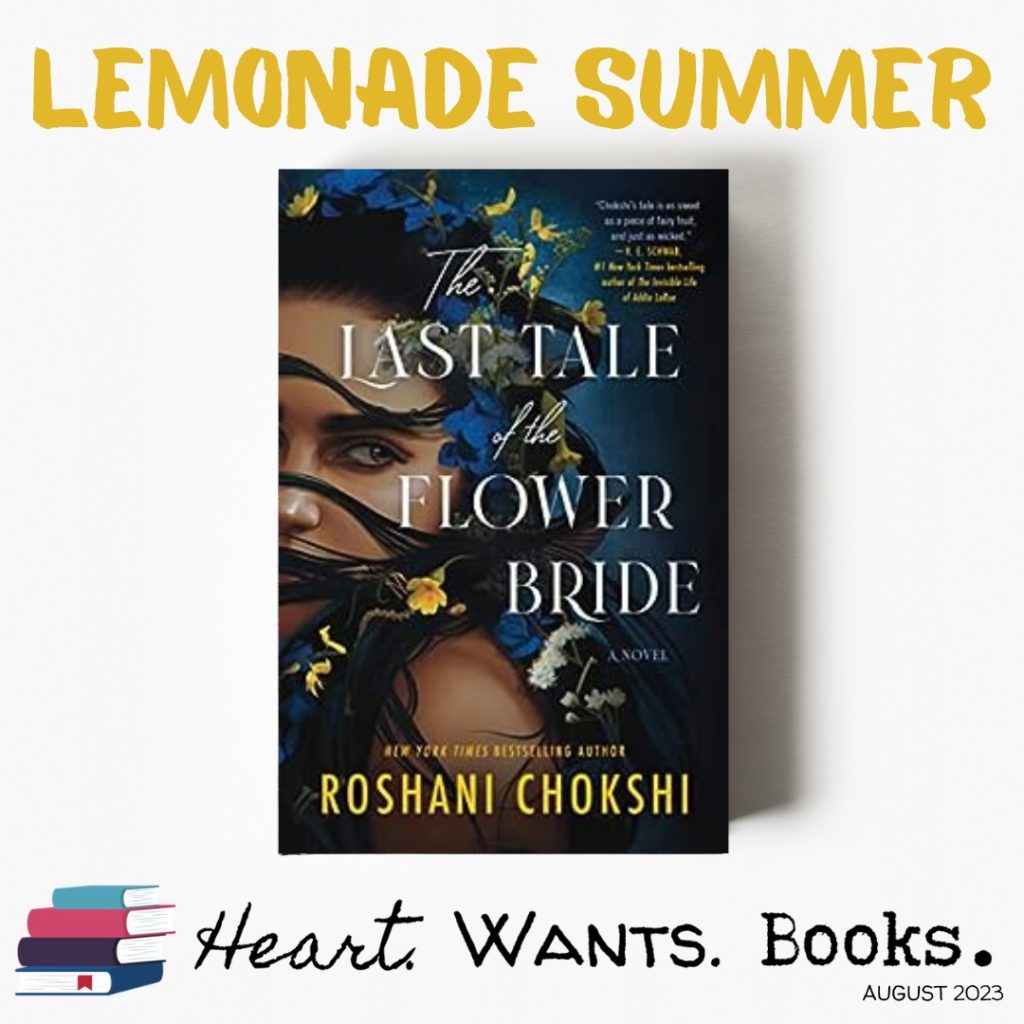
PLEASE SUPPORT US WHEN YOU SHOP BY FIRST CLICKING ON THE IMAGES BELOW:
- « Previous Page
- 1
- …
- 7
- 8
- 9
- 10
- 11
- …
- 86
- Next Page »




